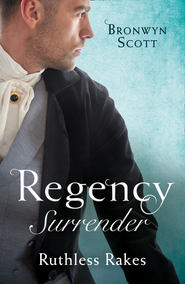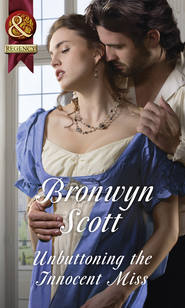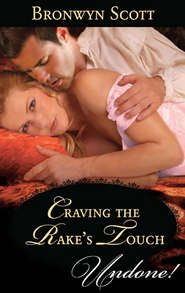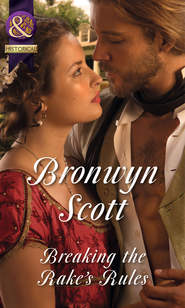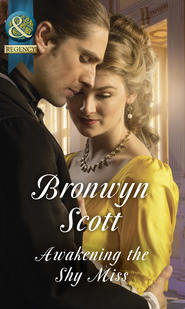По всем вопросам обращайтесь на: info@litportal.ru
(©) 2003-2024.
✖
Pleasured by the English Spy
Настройки чтения
Размер шрифта
Высота строк
Поля
This man was older than St. Just. That had been a mistake she wouldn’t make again. She’d seen St. Just’s youthfulness. The viscount couldn’t have been more than twenty-three, and she’d assumed he hadn’t had the sharp skill to divine what was going on around him. This man was closer to thirty.
This newcomer, this Andrew Truesdale, wore his intelligence in his eyes. He was making no effort to conceal the sharp mind that lay behind those forget-me-not-blue English eyes of his. There was something else in those eyes too, when he looked at her: unambiguous desire. He wanted her. That made him doubly dangerous. She could imagine wanting him too if things were different. He was handsome and golden with his thick hair and tanned face. He carried with him none of the brooding darkness that had accompanied St. Just.
“We’re very busy just now,” she said, wiping her hands on her skirt. “The grapes need to be picked and processed for wine and after that the olives will be ready. Olives have to be milled and pressed within twenty-four hours of harvesting, so it will be a demanding time.” She thought she was successfully fobbing him off, but his eyes told a different story. Was he laughing at her?
“I’ll stay. I don’t mind a hard day’s work. I helped out with countless harvests at my grandparents' during my youth. They owned a farm near Fiesole.”
“That would be great,” Piero enthused, clearly eager to have some new male company. “We can use an extra pair of hands. I’ll show you up to the house and you can get settled.”
Olivia shot Piero a withering look. Her cousin-by-marriage was aiding the enemy without permission, allowing him to turn her dismissal into an invitation. Now there was nothing she could say to his genuine offer without looking exceedingly suspicious. That was hardly what she wanted. Further protest would only serve to confirm St. Just’s original concerns. Now, instead of sending the newcomer off to a pensione to cool his heels, she’d have him underfoot day and night. Tempting her as he was already with those smiling eyes.
She tried to dissuade him anyway. “There’s a lovely inn right inside the town walls. It’s not a long ride from here. Wouldn’t you be more comfortable there? We cannot offer you the level of hospitality we could offer at another time of the year.” If there was an ounce of the gentleman in him, he would understand this was a request to leave. Any well-brought-up Englishman would know this. Had they changed so much in the ten years she’d been away?
His eyes caught hers, silently acknowledging that he received her hidden message, but the slow smile that teased his fine mouth suggested he would not be denied so easily. “I assure you, I will be perfectly comfortable in the bed you offer.” It was said gallantly, but the oblique reference to beds sent a frisson down her spine. She blushed.
“Did I say it incorrectly?” He feigned innocence, cleverly blaming his comment on a lack of skill with the language.
“I understood precisely what you meant,” she retorted archly. She didn’t believe his ploy in the least. He had proven hard to defeat, and he would find her just as difficult. She would not be easily persuaded by his charms, bountiful as they were. But perhaps she could use that to her advantage.
Olivia watched the two men walk towards the house, her whirling mind deliberately slowing so that she could determine what needed to be done and why. The Englishman had come to see if there was substance behind the rumors of revolution and to quash them. It was the quashing part that worried her most. She wasn’t sure what that would entail: a stern message from the British calling for the would-be revolutionaries to desist, or something more? Imprisonment? A few exemplary deaths? Betrayal to the hodgepodge of city-state governments?
She had to protect Piero. He was her late husband’s cousin and he’d been her strong right hand in the three years since her husband’s death. Regardless of how she felt about his politics, he had stood her friend without question, without a secret agenda, which was more than she could say for the tawny-haired Englishman. He was not here to make friends. Butperhaps he could be compelled to take a lover, a tiny voice in her head suggested.
Olivia studied the broad-shouldered visitor walking into the distance, taller even than Piero, the sun burnishing his thick hair to a shade of antique gold. Handsome and strong, he was a confident man who would not find it difficult to believe a woman desired him.
Olivia turned back to the shed and the vat of awaiting grapes. She had her plan now. It was simple. He’d already indicated an interest of a sensual nature, given her the tool she needed to bait the trap. She would seduce his secrets out of him, determine how dire the quashing measures were permitted to be and proceed from there.
She would be in charge of how far the faux affaire went. She had no intention of sleeping with the Englishman. She did not take lovers on a whim. But she saw that much could be gained from a dalliance with him—and in short order. Acts of physical closeness heightened the sense of intimacy, whether it truly existed or not. It opened the way for the exchange of confidences—and quickly. Within the week, wagons loaded with olives for the mill would start to arrive, and with them, one wagon would hold the next step to Piero’s dreams of an united Italy.
She must act immediately. She would start tonight at dinner. There was no time to waste in a traditional flirtation drawn out over weeks or months.
Around him in the vineyard, activity came to a standstill in the purpling dusk. Andrew looked up from the vines where he was working and saw the reason for it. A long line of torches paraded from the house, bringing with them the smells of dinner. The workers let out appreciative cheers and hurried to ready the makeshift trestle tables in a nearby clearing.
Andrew helped lift wide planks of wood onto the trestles. The parade of women entered the bustling clearing loaded with baskets and trays. Men rushed to take the torches and lanterns, placing them around the area. Andrew knew the light would be used for dinner and later for picking grapes into the cool of the night.
Long cloths fluttered and settled on the wood planks, transforming them instantly into real tables. At one end of a table, he caught sight of Olivia laughing. Her smile was back. There was no trace of the chilly welcome she’d given him. Her hips swayed gently, unintentionally, as she laid out plates for the meal. There was no time like the present to further his acquaintance with the contessa. Andrew found his way to her side and lifted the basket of dishes from her arm. “Let me help you,” he said, not waiting for a response. But she offered none. She let him take the basket without protest.
“What do you think of our little vineyard?” She laughed up at him, taking a plate from the basket.
“I’d hardly call it little, although vineyards always seem bigger when you have to pick them.”
“I estimate we’ll be done tomorrow. Then it will be time to move on to the olives.”
A woman deposited a pitcher of wine on the table, accidentally jostling Olivia in the process. The contessa swayed towards him, off balance.
Andrew steadied her, appreciating the soft curve of her breast against him where their bodies collided. His body stirred at the scent of her. She smelled of the kitchen and the winery: yeast and bread, grapes and fruit. To him, she smelled of home, the smells he’d hungered for when he’d been sent back to England at fifteen. She gave a small smile that was neither coy nor shy, acknowledging the brief but intimate contact between them.
“Will you sit with me for dinner?” Andrew asked in low tones, his voice surprisingly hoarse.
Dinner at the long tables was a loud, boisterous affair full of good humor and jokes. Wine flowed from never-empty earthenware pitchers, twilight deepened; the torches glowed more intensely against the darkness. People began to drift back to the vineyards, stomachs full, ready to work a few more hours. Snatches of country songs sprang up deep within the rows, calling those at the tables to join their fellows at work.
Andrew rose, reluctant to leave the woman at his side. Their table was nearly empty now. He would not have anyone say he’d played the idler. But Olivia stayed him with a gentle hand on his arm. “They will not miss you. Piero says you worked hard today and you are, after all, a guest.” She held out her hand to him and issued a soft, promising invitation. “Come walk with me.”
Chapter III
She drew him to an already harvested section of the vineyard that looked down into the valley below. Flashes of silver in the dark suggested that a river flowed down there. Perhaps in the daylight he might even see a town. But for now, all he could make out was the shapes of hills and a few contours of the land. Behind them, the torches cast fingers of light in their direction.
“This is one of my favorite views in the daylight,” Olivia said quietly, settling herself on the ground. Andrew sat down beside her, privately wondering when the last time was that he’d sat directly on the ground. The outdoor entertainments in Vienna had been carefully planned excursions to the Black Forest, complete with tents and chairs and glass goblets. He could imagine what his friends—what his best friend, Camden Mathison—would say, seeing him now.
“You’re lost in thought.” Olivia drew him back to the present.
“I find myself swamped with reflections,” Andrew admitted. “I’ve been away from this life for a long time, not all of it by choice. Being here today brings it all back.”
“You were raised here?” She queried, somewhat surprised by the reference. He’d mentioned earlier that he’d spent some time in this area, but being raised here was far different from merely paying a visit.
“Near Fiesole. I lived with my mother’s parents until I was fifteen. My father was English. He left when I was two. He had a brother who needed him in England, and my mother did not wish to leave her home. By then the romance had dried up between them. If she’d ever changed her mind about joining him later, the growing wars with Napoleon put paid to any such notion.” Andrew shrugged in the darkness. His father’s desertion had always been something he’d tried to treat with nonchalance but had yet to succeed.
Вы ознакомились с фрагментом книги.
Приобретайте полный текст книги у нашего партнера:
Приобретайте полный текст книги у нашего партнера:







